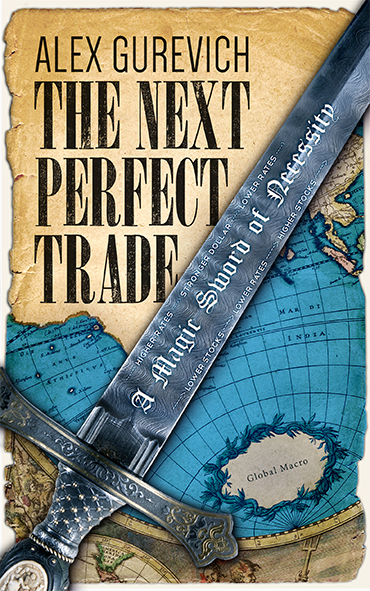
Inflationary apocalypse or deflationary apocalypse? Which way is the United States heading?
Both doves and hawks have their arguments, and their statistics, and their indicators.
Those, who pay attention to strong dollar and headline inflation, argue that a rates hike by the Fed would be a terrible mistake, pushing the country into recession and the negative yields hell experienced by Europe and Japan.
Those, who view the improving labor market as an undeniable indicator of imminent wage pressure and inflationary spiral, consider the Fed to be way behind the curve.
If we take one side of this debate, let’s not call the other side stupid. They have their points. Let’s also not automatically assume that the Fed is stupid. Janet Yellen’s carefully hedged language from the last policy meeting and the press conference reflects that she is aware of the complexity of this puzzle.
As a sideline, I think the Fed is often forced to be somewhat disingenuous, because “we have no idea what’s going on, so we’ll just try to wing it”, might not go over well with the public. They are forced to appear to have an opinion, when I believe they have none (in the very least no consensus opinion).
Having said that, the markets are made of people who think they recognize something that others don’t. So let me respectfully share some of the things I think I recognize.
There is a common problem in partisan politics that tends to surface in financial markets debates. Opinions get packaged.
I would not be the first one to point out that there is no particular reason why, if a person is for tighter financial regulations, they should be also be pro- choice, anti- death penalty, pro- marriage equality, pro- gun control and so on. I don’t think that the majority of people package their opinions for political expedience. Rather, I suspect, they are unconsciously programmed to bundle their views according to a template laid out by our political history and media dialog.
Traders have no political reason to package their views, at least no rational reason. Yet decades of observing the economy and the markets have taught us to associate:
- Stock rally with wage pressure
- Economic growth with inflation
- Corporate profits growth with expansion
- Government bonds rally with recession
- Deflation with stagnation
- Flat yield curves with economic pessimism
- Low commodity prices with economic slowdown
I could go through many such pairs. Needless to say, those relationships went a little haywire in the last few years. In the very least, we have a strong stock market with decent economy accompanied by lackluster wage growth and very low interest rates.
I feel that market players are choosing between roughly three packages:
1. Stocks are grossly overvalued, We are heading towards a deflationary disaster. Rates are going down.
2. Stock market is reasonably valued. The economy is in a cyclical expansion. Rates are going up.
3. The Fed is far behind the curve. The inflation is about to get out of control, the expansion will stifled by rising rates.
As I have stated above, all of those positions have historical precedents and cyclical arguments to back them up.
My own SECULAR view, however, unpackages those positions.
I am very bullish on long-dated US Government Bonds, but I am also cautiously bullish on stocks. I think there are risks on the near horizon, China slowdown being an obvious one.
But I recognize the following secular trends:
- Global labor redundancy
- Lack of wage pressure
- Global disinflation
- Global explosive economic growth
- Explosive growth in corporate profits
In fact, I allow the possibility of us heading into the future where deflation and negative rates (as a price for safe dynamic liquidity) will be a norm. And despite disinflation, I believe that future trillionaires are already born.
Clearly, the burden of proof is on me. I have to make an argument that “this time is different”. And usually “this time is different” story has an ending “well, it turned out to be just like the last time”.
The disinflationary jobless growth scenario hinges on the interpretation of globalization and automatization. And history so far has shown that when progress eliminates one kind of jobs it creates others.
I think this history is no longer applicable. People were speaking of accelerating science and technology for centuries. But up until the recent decades they mere moving and accelerating at the pace set by human intelligence.
We were designing new tools, but those tools were requiring humans to manufacture and operate them. The more complex the tools were, the more highly trained the humans were required to be. And with tools humans were able to make more impact thus, in fact, maintaining demand for their labor in the exponentially growing economy.
It is still mostly true. Computers aid our thinking and research, but the bulk of changes and innovation is driven by human creativity. Yet the balance is shifting.
Singularitarians (such as Ray Kurzweil) believe that we are on the brink of explosive self-acceleration led by computers designing better computers, which design better computers even faster, and rapidly surpassing every aspect of human intelligence.
Singularitarian philosophy is migrating out of the province of science fiction writers into the mainstream, and can no longer be ignored by long horizon investors.
I don’t know when we will be uploading our minds or merging them with artificial intelligence.
But I do see that we are shifting into the world where more and more able-bodied competent adults do not have sufficiently marketable skills.
And those of us who are still doing well, say trading, shouldn’t get too comfortable. The algos are breathing hot on our heels.
I want to be clear. My core strategy over the last couple of years – long dollar, long bonds, long stocks – is not predicated on any conviction about “economic singularity”. Rather, I am following market patterns and trends that I currently observing. And questioning some old economic paradigms doesn’t equate to disregarding historical market patterns (such as strong performance of the long end of the curve in the tightening environment).
In fact, my portfolio strategy does not require an over-arching philosophy. But the idea of economic singularity allows me to have a clear and consistent theory of unfolding events.
- I can be positive on stock market without being scared of valuations
- I can be long bonds without fear of job growth
- I can anticipate the Fed tightening without conjuring an imminent global depression
- And even when I contemplate the possibility of catastrophic China collapse, I can see light on the other end of the tunnel
The Fed doesn’t have have the luxury of including the singularity into their discourse. They have to appear serious and academic.


